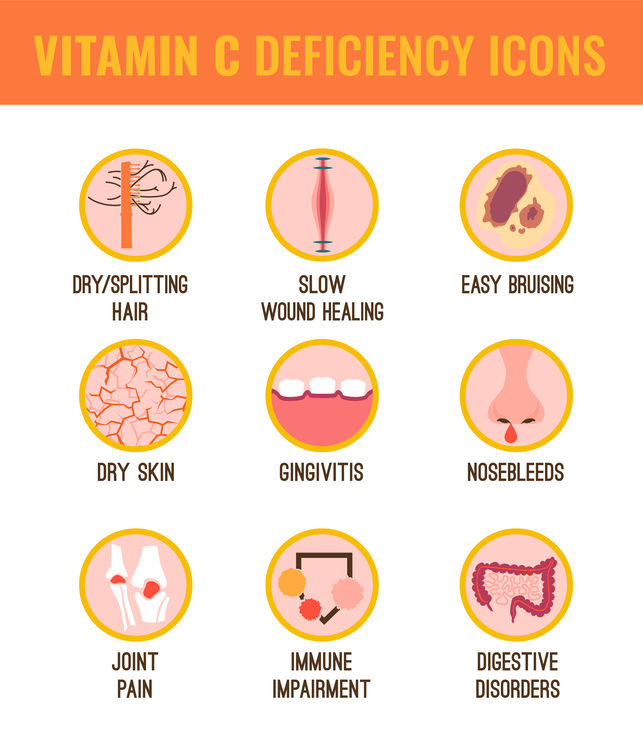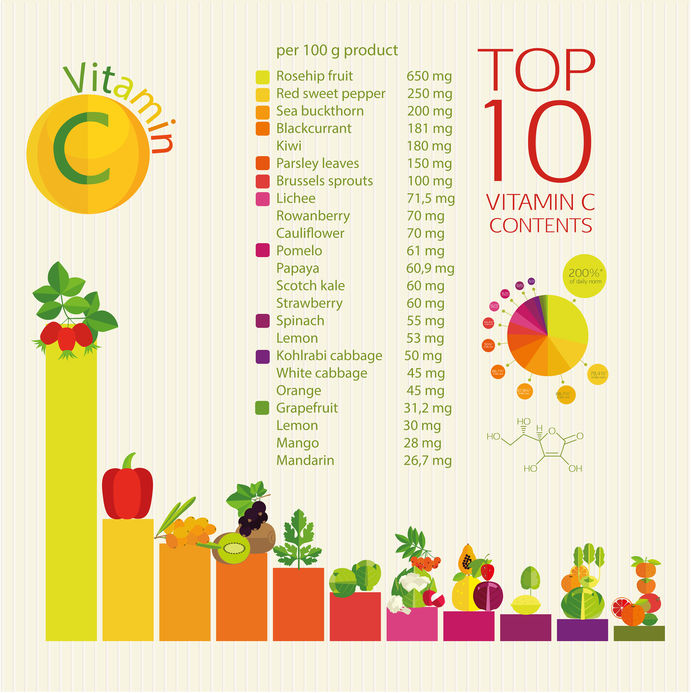There are some things our body can live without, but Vitamin C is not one of them. Vitamin C is an essential water-soluble nutrient that must be replenished regularly in order to prevent a deficiency.
In some countries, especially the ones that are more developed, a Vitamin C deficiency is not all that common because of how widely available and affordable fresh produce and supplements are. However, there is a small percentage of the US population that is deficient in this vital nutrient. This could be due to various factors including smoking, dialysis treatment, poor diet, or alcoholism. Anorexia and certain types of serious mental illness are also contributing factors.
While this deficiency may not be common in some parts of the world, the risk of developing it over time is real. According to statistics about 7% of the American population suffers from a Vitamin C deficiency. The deficiency doesn’t happen overnight and can take up to three months to surface, but if you think you might not be getting enough of this vital vitamin in your diet, here are a few telltale signs to look out for.
How Much Vitamin C Do You Need?
Before getting into the signs and symptoms let’s look at how much Vitamin C you should be getting from your diet every day. According to the dietary guidelines set forth by the U.S Department Of Health and Human Services, the recommended daily allowance (RDA) of Vitamin C varies from person to person depending on your age, gender, and current state of health.
- The RDA for children between 1-3 years old is 15mg.
- The RDA for children between 4-8 years old is 25mg.
- The RDA for adolescents between 9-13 years old is 45mg.
- The RDA for teenagers between 14-18 years old is between 65 to 75mg.
- The RDA for adult women who are 19 and older is 75mg.
- The RDA for adult men who are 19 and older is 90mg.
- The RDA for pregnant women who are 19 and older is 85mg and those who are breastfeeding is 120mg.
It doesn’t take much to meet these daily allowances at all. If you are 19 an older a ¾ cup of orange juice or cup of broccoli is enough to meet these requirements.
The body cannot produce its own Vitamin C, it must be sourced through diet alone, which is why it is important to make sure you eat foods that are rich in this nutrient to replenish your body’s supply regularly.
Signs You Are Vitamin C Deficient

Compromised Immunity
When it comes to the flu and cold season, many know that the best way to boost the immune system is by taking Vitamin C. When our immune systems are compromised, Vitamin C builds up in immune cells and contributes to their defenses against harmful pathogens and infections.
When you are not getting enough Vitamin C in your diet, your immune system becomes weaker and puts you more at risk for developing more serious infections like pneumonia and other respiratory infections. A Vitamin C deficiency is what causes Scurvy, a serious disease that leads to anemia, spontaneous bleeding, and a compromised immune system that is unable to fight off infections and can be fatal.
Rough Bumps On Skin
Vitamin C plays a crucial role in the production of collagen – the protein that is vital for connective tissues, joints, skin, hair, bones, eyes, and blood vessels. Without Vitamin C, the body is unable to synthesize adequate amounts of collagen to maintain the health of these important organs and tissues.
A Vitamin C deficiency can cause tiny bumps similar to goose flesh that appear on the skin under the arms, on the thighs, and the buttocks, which is known as keratosis pilaris. Keratosis pilaris occurs when too much keratin protein builds up inside the pores and forms a scaly plug over hair follicles, which can make the skin feel rough and bumpy. This common telltale sign is not dangerous, but it can be addressed by supplementing with Vitamin C or adequate intake from your diet.
Abnormally Shaped Body Hair
One of the most prevalent signs of a Vitamin C deficiency is corkscrew or coiled body hair. As we mentioned before, Vitamin C plays a crucial role in collagen synthesis, which is one of the main proteins found in hair. A deficiency in this essential nutrient causes the hair shafts to coil or bend while they are growing thanks to the defective hair proteins. It’s not always the most obvious sign as these misshapen hairs tend to break or fall out easily before you notice something’s wrong.
By supplementing with adequate amounts of Vitamin C, this symptom should subside after a month or two of treatment.
Wounds Heal Slowly
Due to the fact that a lack of Vitamin C affects the amount of collagen produced within the body, wounds heal much slower than they would without a deficiency.
One study outlined that those who suffer from chronic leg ulcers that don’t heal are more likely to be deficient in this essential vitamin than those who don’t suffer from chronic leg ulcers.
It takes a few months for this symptom to arise and is normally associated with those who have a more severe deficiency. A healthcare professional should be able to pick up your deficiency before it gets to this advanced stage.
Bleeding Gums
Swollen, sore, bleeding gums is another telltale sign that you may not be getting enough Vitamin C.
Vitamin C helps keep blood vessels healthy and plays a role in clotting blood. When there is not enough Vitamin C, it causes inflammation in the gum tissue and blood vessels to rupture easily. In some severe cases, the gums turn purple and appear as though they have become rotten, which also lead to tooth loss.
Supplementing with Vitamin C can help when you first notice bleeding gums. However, If your gums have already turned purple, it’s best to speak to your doctor or dentist.
Other Signs To Look Out For
If you are still not sure that you are getting enough Vitamin C, here are a few other signs to look for:
- Persistent fatigue and moodiness
- Swollen and painful joints
- Bruising easily
- Dry, dull skin
- Frequent nosebleeds
- Thin and brittle nails that have concaved
- Perifollicular hemorrhaging (red hair follicles)
- Anemia
- Weight gain
- Inflammation
- Weakened bones
Foods That Are Rich In Vitamin C
Fortunately, most of the symptoms mentioned above can be reversed by simply increasing your Vitamin C intake. As we mentioned, it is not hard to meet the daily requirements either considering that all it takes is a ¾ cup of orange juice or a cup of broccoli. If you are looking to boost your immune system and fight off that sluggish mood, here are the best food sources of Vitamin C:

The Takeaway
While a Vitamin C deficiency is rare in some parts of the world, there is still a very real possibility of developing one especially for those who are heavy smokers and drinkers, are on dialysis, or follow a very poor diet.
If you think you may be deficient in this nutrient, there are a few signs you can look out for including coiled body hair, bumpy rough skin, joint pain, red gums, and easy bruising. As the deficiency gets more advanced, it could lead to anemia, brittle bones, and even tooth loss.
As scary as these symptoms may sound, the good news is that most of them can be reversed by getting adequate amounts of Vitamin C from your diet. If you are feeling a bit low on this vital vitamin or looking for a quick immune boost try adding some fresh produce like cherries, blackcurrants, and sweet red bell peppers to your meals.

